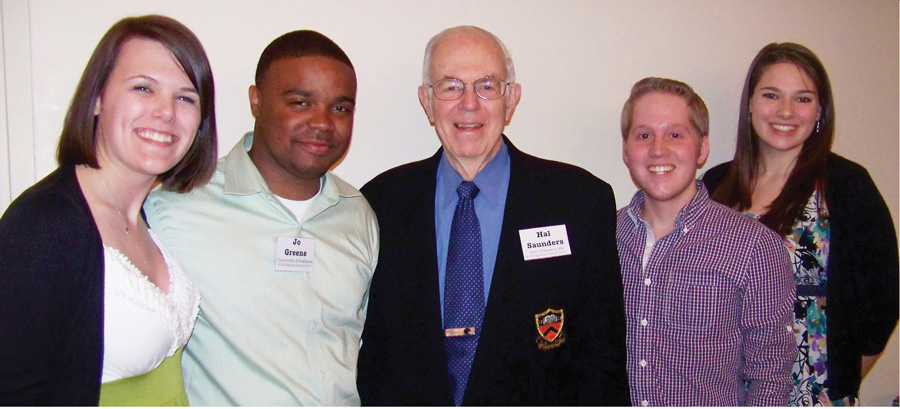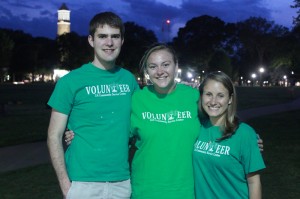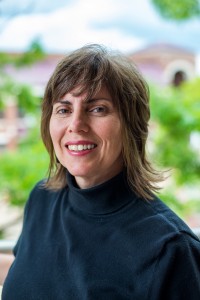Crossroads Community Center currently offers programs such as Sustained Dialogue and the Interfaith Initiative, and new programs are in the works. In fact, one of them may just be the one that you initiate!
Students from varied backgrounds and majors are invited to share their creativity and vision as part of the Crossroads Experience. Join us at Crossroads Community Center and share your talents and energy while developing intercultural relations and knowledge. Here’s who we are, how to learn more about us and how to contact us:
Crossroads Community Center
232 Ferguson Center
The University of Alabama
205-348-6930
www.crossroads.ua.edu
facebook.com/uacrossroads
@crossroads_UA
If you like addressing challenging issues in a respectful, affirming environment, join us at Crossroads and take advantage of the opportunities for sharing cultures, conducting research and creatively engaging in the many cultural challenges on our campus, in the community and around the world.

We live in a multicultural society and it is not a temporary condition. It is here to stay. We seek students who desire to develop the tools for living in and contributing to a multicultural society. Crossroads is your gateway to acquiring these tools.
And what are these tools? One is research. The kind of research we conduct at Crossroads and at our sister program, the Center for Community-Based Partnerships, is known as community-based research or CBR. Only when we conduct research about our programs and interactions do we know what works and what doesn’t, what builds capacity and what doesn’t. Research is fundamental to all learning, and that includes intercultural learning.
In Sustained Dialogue students discuss important social issues, get to know each other, and work on those social issues together. The model may be used in national, community, corporate or campus settings. Effective democracy and economic development depend on building effective relationships. Sustained Dialogue helps make them happen.
Student moderators are selected by The University of Alabama and trained by the national Sustained Dialogue Campus Network. By offering their students experience with the SD model of dialogue, colleges and universities improve their campus communities and enhance the professional and personal lives of their students during and after college. SD helps students make time to understand perspectives of individuals they would not otherwise meet; interact comfortably with all kinds of people; build relationships across communities; and gain communication skills necessary for increasingly diverse academic, social and work environments.
How it works. Students are placed in dialogue groups of 8–10 diverse members who meet one hour a week with two student moderators who help facilitate the conversation about issues such as social identity, campus life and politics.
Interfaith Initiative. Instead of seeing personal beliefs as differences that divide, the Crossroads Interfaith Initiative draws on the work of the Interfaith Youth Core (IFYC.org), to advance a view of religious and philosophical traditions as bridges for cooperation and understanding. This movement promotes:

In spring 2013, UA students attended IFYC’s Interfaith Leadership Institute in Atlanta to learn more about how they could improve interfaith opportunities on campus. As a result of this experience, Crossroads Community Center hosted Dwell Better Together in which panelists of different religions and beliefs addressed students prior to the Community Service Center’s poverty awareness Sleep Out event on the Quad, an event designed to heighten awareness of poverty. Panelists who were Christian, Muslim, Sikh, Jewish, atheist and agnostic spoke about each tradition’s approach to caring for those in need.
Another intercultural tool is creative activity. Creative activity, which is not limited to the arts and humanities, includes art, music, dance, sculpture, writing, communication, the sciences, social science, sports, debate and drama. All of these and more, can be explored as part of the Crossroads Experience.
By Kirsten J. Barnes
CCBP Graduate Assistant

Looking back after six months in her new job as director of Crossroads Community Center, Lane Busby McLelland, the former assistant director of New College, is excited by her new responsibilities, which she sees as an opportunity to apply all her academic and life experiences to the challenges facing higher ed today .
McLelland holds a master of arts in ethics, a master of divinity and an interdisciplinary bachelor’s in international studies and conflict management. She is currently a Ph.D. candidate in the Social and Cultural Studies Program in the College of Education.
“I loved what I did in New College, but coming to Crossroads gives me the opportunity to develop my fundamental areas of interest even more,” she said.
Crossroads Community Center provides leadership at UA in cultural programming and intercultural education by developing and hosting a variety of cultural events and dialogue programs that build community among the diverse groups on campus. It pursues its mission by engaging the energies of faculty, staff and students in the creation, implementation and evaluation of intercultural experiences.
McLelland sees her new job from several points of view. “I love working with people of different perspectives and backgrounds and seeing them work together,” she said. “Whether I am introducing domestic students to international students or convening stakeholders on campus for dialogue about controversial issues, I love seeing people build relationships across the differences they previously believed divided them. Because I’m coming from a program (New College) that values interdisciplinary work, I believe in bringing multiple perspectives to solving problems in society. My life has been interdisciplinary.”
Before beginning a teaching career at Shelton State Community College in 1999 and taking a position teaching full-time at UA in 2008, McLelland worked in various roles in the fields of religion and ethics. During the mid-1990s she worked in Atlanta for the Health Care Ethics Consortium of Georgia at the Emory Center for Ethics and served as a chaplain in the Olympic Village during the 1996 Summer Olympics.
All of these jobs, she believes, prepared her for her new job. “My work in New College always emphasized placing students in embedded community-based learning opportunities,” McLelland said. She said she looks for projects to get students and community members talking and working side-by-side. “I’ve done a great deal of work in the last two years to get students living and working in the community to help community partners solve problems together.”
In addition to her academic and service credentials, McLelland served as a United Methodist minister at Chinese Community United Methodist Church in Oakland, Calif., and Trinity United Methodist Church in Tuscaloosa. Also, she taught at Tunghai University in Taiwan and later worked with China-related organizations in Washington, D.C. As she implements custom-designed cultural programming for maximum effectiveness for the University, McLelland draws on her life experiences of living in working in cultures dramatically different from her own life growing up in Alabama.
McLelland said she missed teaching during her first semester at Crossroads, but is developing a new course that will also advance the mission of Crossroads. “I hope to offer some special courses that meet the goals of the academic departments and the goals of Crossroads: critical thinking and deliberative-dialogue,” McLelland said. This fall she is teaching Through the Open Doors: Sustained Dialogue for Courage, Change, and Progress.
Fifty years ago dramatic confrontations called for extraordinary courage for change and progress to occur at the University of Alabama. In 2013, the challenges are somewhat different, but the skillful dialogue for changing social norms resistant to progress continues to demand courage from student leaders, according to McLelland. “Today, deep courage is needed to talk honestly with each other and listen respectfully to those with whom we profoundly disagree. The next fifty years will call for students who can lead their peers in meaningful exchanges for positive action together.”
Her new course will examine the theoretical foundations of the student body politic as it has developed over the last half century. Comparing these to emerging theories for a 21st century Politics of Relationship and using the Sustained Dialogue Model for engaging opposing viewpoints, students will then explore the potential of this five-stage dialogue-to-action process to build on-going working relationships across historical divisions on campus.
In appointing McLelland, Dr. Samory T. Pruitt, vice president for Community Affairs, said, “Crossroads Community Center provides important intercultural leadership and dialogue programs for the campus and communities both near and far. We are most fortunate to have someone of Ms. McLelland’s background, credentials and motivation in this position.”
McLelland succeeds Dr. Beverly Hawk, who has joined the Center for Community-Based Partnerships as director of program services. McLelland received her bachelor’s degree from UA and both graduate degrees from the Pacific School of Religion in Berkeley, California.
For more information on Crossroads, call McLelland at 205-348-6930 or email her at lane.mclelland@ua.edu.